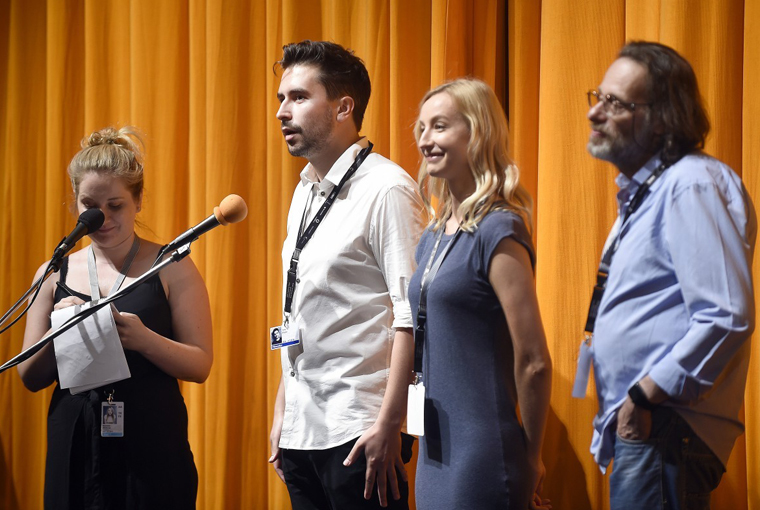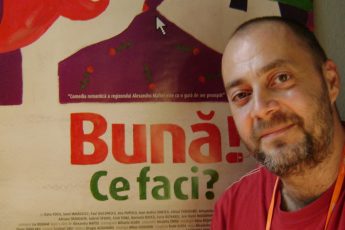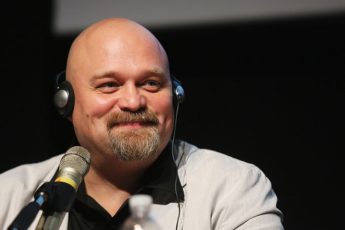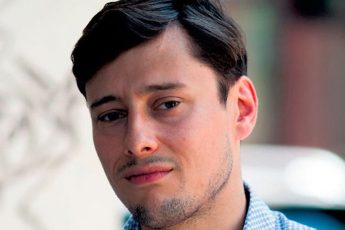
We met Ukrainian filmmaker Yuriy Shylov at the Karlovy Vary International Film Festival (June 28-July 6), where his “Projectionist” competed for the main documentary award. Shylov speaks about the main idea behind the film, and explains how it relates to current happenings in Ukraine.
Could you start by telling me about the two titles of your film, since the English title is “Projectionist” but the original title is “Panorama”?
“Panorama” is the name of the cinema that we filmed, so when I started to make the film that was the project title when we were applying for funding. I also made a short version of this film, which was called “Panorama”, and then I continued to make it bigger, so we kept that title for the feature too since that’s how it was known in Ukraine. But in my parallel life, I had a lot of pitches, such as in Karlovy Vary last year, and the international title “Projectionist” came out of that experience and it stuck with me.
The duality of two titles is interesting because they each refer to one of the two main aspects of the film, namely the cinema and the projectionist respectively, so I was wondering which of the two came first for you. What was your original intention?
Panorama is really universal and it wasn’t about that specific cinema, and I wasn’t at all interested in the cinema itself, like the building or its history. I’m much more interested in people and human beings, so it was really about the protagonists for me. But I don’t mean it in the sense of their profession and how they work, how they handle the tapes or what happens during the screening. I liked the way they were living and the themes that I saw and can show from the projection of their lives.
So how did you come to this particular protagonist and this particular cinema?
I was shooting for a casting agency that was based in this cinema, which is one of the largest. 200 people come there for the castings every day, but there were only two or three people in the movie screenings. So I found it interesting that the cinema was somehow dying, but the casting agency was very lively and funny with a lot of people. So I started shooting this process but I realized it was all bullshit, and I was sitting in the projection room, smoking, thinking about how I would do it, which is when I started speaking to the projectionist, Valentin, who was also smoking and told me, “Don’t worry, everything will be alright. Don’t panic.” And then someone called from administration to ask who I was and what I was doing there smoking, and he said, “Oh, he’s my son.” And from that I understood that he could be the main protagonist, and I also included the theme of casting with the casting manager girls who he goes drinking with.
You said that Valentin came to the premiere screening. Was it the first time he saw it and how did he react?
Yeah, it was his first time. He liked it, but some episodes were not as funny as he had imagined them to be, and I had the impression he wanted more funny moments. He was asking, “Why do I look so sad here?” But he liked it overall. He was smiling a lot and sometimes when we were watching the film it was silent in the cinema, even though he was laughing at himself up on the screen. After the film, we didn’t bring him on stage immediately. We started with the producers and then when we showed him, he was like a star and I think it was a great moment for him. I think we made his life longer.
He’s definitely a charismatic and strong protagonist, but how was it to work with him? During filming, you go through a lot of intimate moments together.
Of course, it’s always like that when you talk about people. It’s not black and white, there is a lot of color and emotions, ranging from hatred – there were times when I wanted to kill him, or when he probably wanted to kill me – to love, which I think you can tell. Of course, it was hard sometimes, and I took several pauses and didn’t always film him.
Could you predict what would happen with both Valentin and the cinema when you first began shooting? Or was it all unexpected?
It was in the air the whole time when I was shooting. Something could have happened any day. In terms of his friends, I didn’t know who would be there on the next day, so sometimes I would see him calling and I would think, “Oh, maybe someone died.” It was the same with the cinema. It was totally possible that one day the wall would collapse or it would be closed, because sometimes there were no screenings. But then when it actually closed, I didn’t see it coming, because it was really like a splash. They closed it in a day, and I shot a lot because there were actions against it and protests from the citizens of Kyiv, but I just included a small episode about it because I didn’t want to go in the direction of talking about the politics of the building. I just showed a bit of how it affected their lives. The end. Yesterday during the Q&A, someone asked Valentyn if he thought it was a pity that the cinemas were closing, and he said, “No, it’s progress! It should be like that and it’s okay that it’s like that, we can see more.” So we shouldn’t be so weepy about it, it’s okay.
So we shouldn’t have nostalgia for the past but optimism about the future?
Of course, there’s a lot of nostalgia and it’s also in the film. To me and to other people, these movie theaters and the people working there looked like dinosaurs. Valentin’s flat, the music he listens to, and everything else – it’s still from the 1970s, 1980s and maybe a bit from the early 1990s, that’s all. And when you see them like dinosaurs you realize it won’t be long until they’re gone – both the people and the buildings – so it was interesting to film it, and of course there was some nostalgia in it, but it was also an honor. I saw them with love, and I wanted to show that.
It’s a really interesting and poignant moment for the film to be coming out, given the “Occupy Kyiv Cinemas” movement, for example. How do you see the closures that are taking place?
We had four cinemas that showed European and festival films, and last year we lost three of them. The first one to be closed was “Kinopanorama”, the one featured in my film, which had been working for 44 years. It was a very old building and even caught fire once because of a short circuit, as you can see in the film, so the administration put Valentin into retirement and then closed down the whole cinema. It was mainly because the owner wants to turn it into a hotel, and unfortunately he has the legal right to do it since the Kyiv government sold it to him 10 years earlier. Then another old cinema in the city center also closed down since the owner couldn’t make a lot of money there. So now we have just one, the oldest, “Zhovten”, which burned down 5 years ago and was rebuilt after that. The fire there happened during a festival that was showing LGBT films, so some people caused a fire during the screening and burned down the whole building. But activists pushed the government to rebuild it as a cultural place. Recently another cinema was closed where a lot of cultural events and film festivals used to take place. There was no fire this time, just the fact that the Kyiv government didn’t earn much from it, so the person now renting the building is turning it into a more commercial place, with Hollywood blockbusters. I hope that intelligent society, as always, will do everything to preserve its cultural heritage. But unfortunately, we’re losing places that are very important.
You mentioned that you got funding from the state for the film. How is the general situation with film funding in Ukraine at the moment?
I was lucky, because I finished university at a period when big government spending on films started. Ten years ago times were hard in that regard, but now it’s okay. I didn’t have anything pushed on me. I have a clever producer, Gennady Kofman, who understands all the relations with Goskino, the institute. So it all went much better than I would have imagined. I thought they would have problems with people smoking or something strange like that, or that they would see it as a criticism of Ukraine, but no. They just accepted it.
Do you already have plans for screenings in Ukraine?
The Ukrainian premiere will be at the Odessa International Film Festival, in the national feature competition. There will be four films – two documentaries and two fiction films. So we’ll see how the locals react! I wanted to discuss universal themes in this film, but of course some details will be more interesting and more understandable for them, so we’ll see.
Thank you for the interview.




Leave a Comment